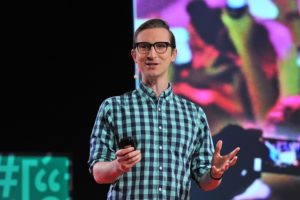AI for Social Good: A Conversation with Jake Porway
by Alex Corindia, MBA’19, Graduate Student Fellow at The Lewis Institute
 Jake Porway is the founder and executive director of DataKind, a nonprofit that uses data science and AI in the service of humanity. DataKind brings top data scientists together with leading social impact organizations, corporations, and governments to tackle their toughest challenges together. Engagements can be anything from weekend hackathons to multi-month projects. DataKind has done over 250 projects to date helping organizations enhance their impact using technology.
Jake Porway is the founder and executive director of DataKind, a nonprofit that uses data science and AI in the service of humanity. DataKind brings top data scientists together with leading social impact organizations, corporations, and governments to tackle their toughest challenges together. Engagements can be anything from weekend hackathons to multi-month projects. DataKind has done over 250 projects to date helping organizations enhance their impact using technology.
Jake is a New York Times R&D Lab alum, has worked at Google and Bell Labs, and is a PopTech Social Innovation Fellow and a National Geographic Emerging Explorer. A recognized leader in the Data for Good Movement, he has spoken at IBM, Microsoft, Google, and the White House. He holds a BS in Computer Science from Columbia University and an MS and PhD in Statistics from UCLA. Jake founded DataKind in hopes of creating a world in which every social organization has access to data capacity to better serve humanity.
This past winter, he spoke to a group of Babson students through the college’s Net Impact chapter. Recently, I sat down with Jake to discuss the future of DataKind and what role Babson students might play.
What is next for DataKind? How do you see it evolving in the future?
We’ve learned that to make a really big impact we can’t just work with individual organizations—we have to go deep into issue areas to make a difference. That’s why we’re now focusing on key issue areas, such as maternal health, renewable energy, and microfinance. We believe machine learning and AI is poised to make a huge impact in those areas. We’ve already seen some of our prototypes from past projects adopted by over hundreds of organizations, so we believe we should be able to find many more examples like that. Five years from now we hope to look back and see that AI transformed social change as much, if not more, than it did business.
Our main mission is to create a world where AI can be used ethically and capably for every humanitarian challenge. To do that, massive changes in the sector need to happen: foundations need to fund AI, more AI talent needs to be trained, more data needs to be made available, and more. We can never make all that change as one, single organization. For us to get to that vision, we need to scale our actual process out to businesses and governments to take forward. For example, imagine if Google and the Gates Foundation ran the DataKind model, providing expert technical talent to the biggest issues of our times. That’s why we are working to standardize our practice and make a kind of “DataKind in a box” that other organizations can adopt and use. In the same way that IDEO shared “Design Thinking” with the world, we hope to share “AI for Social Good” with all those who could use it.
What is your dream project?
I am also personally very excited about climate change projects, therefore anything related to using machine learning to help people deal with the effects of a changing world are really exciting to me. There are huge new opportunities to use AI in that space beyond the climate science people traditionally think of. Satellite imagery and sensor data can be used to see things never before seen, such as how migratory patterns will change or where coastline flooding will most likely happen.
How are social innovators and entrepreneurs like the ones you find at Babson a good fit for this model?
Babson students can have a huge impact with models like this one! The two main factors that make DataKind successful are that we crowdsource talent from around the world, and we help folks use advanced technology. Students going through Babson’s programs are likely versed in the internet and globalization. They can likely offer knowledge and insight in areas where the social sector may not have deep expertise. There are very few people who play that translation role, and because Babson seems so multidisciplinary, I would imagine many budding social innovators could do a lot of good just bridging the divide between what could be in business and what should be in the social sector.
